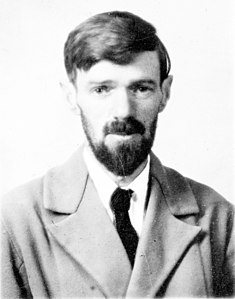Analysis of The Revolutionary
David Herbert Lawrence 1885 (Eastwood, Nottinghamshire) – 1930 (Vence)
Look at them standing there in authority
The pale-faces,
As if it could have any effect any more.
Pale-face authority,
Caryatids,
Pillars of white bronze standing rigid, lest the skies fall.
What a job they've got to keep it up.
Their poor, idealist foreheads naked capitals
To the entablature of clouded heaven.
When the skies are going to fall, fall they will
In a great chute and rush of débâcle downwards.
Oh and I wish the high and super-gothic heavens would come down now,
The heavens above, that we yearn to and aspire to.
I do not yearn, nor aspire, for I am a blind Samson.
And what is daylight to me that I should look skyward?
Only I grope among you, pale-faces, caryatids, as among a forest of pillars that hold up the dome of high ideal heaven
Which is my prison,
And all these human pillars of loftiness, going stiff, metallic-stunned with the weight of their responsibility
I stumble against them.
Stumbling-blocks, painful ones.
To keep on holding up this ideal civilisation
Must be excruciating: unless you stiffen into metal, when it is easier to stand stock rigid than to move.
This is why I tug at them, individually, with my arm round their waist
The human pillars.
They are not stronger than I am, blind Samson.
The house sways.
I shall be so glad when it comes down.
I am so tired of the limitations of their Infinite.
I am so sick of the pretensions of the Spirit.
I am so weary of pale-face importance.
Am I not blind, at the round-turning mill?
Then why should I fear their pale faces?
Or love the effulgence of their holy light,
The sun of their righteousness?
To me, all faces are dark,
All lips are dusky and valved.
Save your lips, O pale-faces,
Which are slips of metal,
Like slits in an automatic-machine, you columns of give-and-take.
To me, the earth rolls ponderously, superbly
Coming my way without forethought or afterthought.
To me, men's footfalls fall with a dull, soft rumble, ominous and lovely,
Coming my way.
But not your foot-falls, pale-faces,
They are a clicketing of bits of disjointed metal
Working in motion.
To me, men are palpable, invisible nearnesses in the dark
Sending out magnetic vibrations of warning, pitch-dark throbs of invitation.
But you, pale-faces,
You are painful, harsh-surfaced pillars that give off nothing except rigidity,
And I jut against you if I try to move, for you are everywhere, and I am blind,
Sightless among all your visuality,
You staring caryatids.
See if I don't bring you down, and all your high opinion
And all your ponderous roofed-in erection of right and wrong
Your particular heavens,
With a smash.
See if your skies aren't falling!
And my head, at least, is thick enough to stand it, the smash.
See if I don't move under a dark and nude, vast heaven
When your world is in ruins, under your fallen skies.
Caryatids, pale-faces.
See if I am not Lord of the dark and moving hosts
Before I die.
| Scheme | ABX ABX XXC DX XX CXCCAXE CX XXCX XFFX DBXX GA BHX AXAX BHC GC BAXAB CXEI XI CXBXX |
|---|---|
| Poetic Form | |
| Metre | 11110100100 0110 111111001101 110100 1 1011110101011 101111111 11010110100 10111010 10111011111 001101111110 10110101010101111 0100111110011 11111011110110 011111111110 1011011110110101011011101110110 11110 01110101110101011011100100 110011 1001101 1111011011 11010001110011011110011110111 111111101000111111 01010 11110111110 011 111111111 111101001011100 1111100101010 11110111010 1111101101 111111110 110111101 0111100 1111011 111101 1111110 111110 1101010011101101 110111100 1011011110 11111101110100010 1011 11111110 110111101010 10010 111110001001001 1010100101101111010 11110 11101101011110010100 01101111111111100111 101111 1101 11111110111010 011100100101101 1010010 101 11111010 01111110111101 11111100101110 1111010101101 1110 1111111010101 0111 |
| Closest metre | Iambic hexameter |
| Characters | 3,032 |
| Words | 513 |
| Sentences | 35 |
| Stanzas | 19 |
| Stanza Lengths | 3, 3, 3, 2, 2, 7, 2, 4, 4, 4, 2, 3, 4, 3, 2, 5, 4, 2, 5 |
| Lines Amount | 64 |
| Letters per line (avg) | 35 |
| Words per line (avg) | 8 |
| Letters per stanza (avg) | 119 |
| Words per stanza (avg) | 27 |
Font size:
Submitted on May 13, 2011
Modified on March 05, 2023
- 2:35 min read
- 71 Views
Citation
Use the citation below to add this poem analysis to your bibliography:
Style:MLAChicagoAPA
"The Revolutionary" Poetry.com. STANDS4 LLC, 2024. Web. 1 May 2024. <https://www.poetry.com/poem-analysis/7890/the-revolutionary>.


Discuss this David Herbert Lawrence poem analysis with the community:
Report Comment
We're doing our best to make sure our content is useful, accurate and safe.
If by any chance you spot an inappropriate comment while navigating through our website please use this form to let us know, and we'll take care of it shortly.
Attachment
You need to be logged in to favorite.
Log In